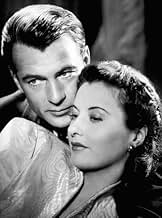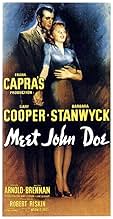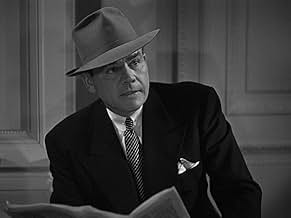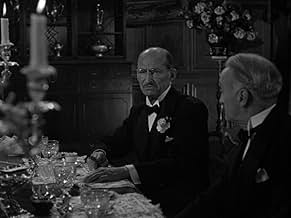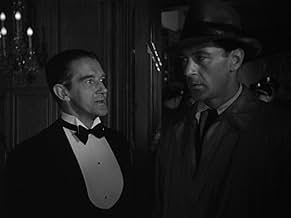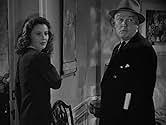VALUTAZIONE IMDb
7,6/10
15.874
LA TUA VALUTAZIONE
Aggiungi una trama nella tua linguaA penniless drifter is recruited by an ambitious columnist to impersonate a non-existent person who said he'd be committing suicide as a protest, and a social movement begins.A penniless drifter is recruited by an ambitious columnist to impersonate a non-existent person who said he'd be committing suicide as a protest, and a social movement begins.A penniless drifter is recruited by an ambitious columnist to impersonate a non-existent person who said he'd be committing suicide as a protest, and a social movement begins.
- Regia
- Sceneggiatura
- Star
- Candidato a 1 Oscar
- 4 vittorie e 1 candidatura in totale
Charles C. Wilson
- Charlie Dawson
- (as Charles Wilson)
Recensioni in evidenza
After doing Mr Deeds Goes To Town and Mr Smith Goes To Washington for Columbia, Capra quit and made this third film about an average Joe thrust into a powerful world where exploitation is high on the agenda, but in true Capra style the story unfolds to a customary flip flop triumph.
Ann Mitchell is a struggling journalist who gets fired from her newspaper job by new editor Henry Connell, by way of venting her frustrations she writes in her stinging last article about a man called John Doe who is tired of being pushed around and held back by the big bosses, she finishes the piece by claiming that Doe will commit suicide on Christmas Eve by leaping off the roof of city hall, the public react to the letter with tremendous heart and Doe becomes a champion of the people.
After Connell gets interested in the letter Ann has to confess that she made it up, they hatch a plan to turn a real unemployed drop out into John Doe so as to continue the story and sell more papers, and of course Ann gets to keep her job. This brings in ex minor league pitcher Long John Willoughby, who is down on his luck and very short of cash, and this is when the story shifts from amiable comedy on to a much darker path, the result making for a riveting watch.
Whilst not being up with the best Capra films in his armoury, it is, however, one of his smartest. The portrayal of the human spirit in many guises is stark and poignant, whilst thematically Capra got his point over about the unsavoury elements blossoming in America. The cast are nailed on watchable, Gary Cooper is John Doe, the right amount of sympathy and guts is garnered from his performance, and in one rousing speech he has the viewers in the palm of his hand. Barbara Stanwyck is Ann Mitchell and she delivers a great turn that calls for a number of emotions to be performed convincingly, while the support cast are all solid with the stand out a bizarrely unnerving Edward Arnold as D B. Norton; a man wishing to be a dictator if ever there was one. 10/10
Ann Mitchell is a struggling journalist who gets fired from her newspaper job by new editor Henry Connell, by way of venting her frustrations she writes in her stinging last article about a man called John Doe who is tired of being pushed around and held back by the big bosses, she finishes the piece by claiming that Doe will commit suicide on Christmas Eve by leaping off the roof of city hall, the public react to the letter with tremendous heart and Doe becomes a champion of the people.
After Connell gets interested in the letter Ann has to confess that she made it up, they hatch a plan to turn a real unemployed drop out into John Doe so as to continue the story and sell more papers, and of course Ann gets to keep her job. This brings in ex minor league pitcher Long John Willoughby, who is down on his luck and very short of cash, and this is when the story shifts from amiable comedy on to a much darker path, the result making for a riveting watch.
Whilst not being up with the best Capra films in his armoury, it is, however, one of his smartest. The portrayal of the human spirit in many guises is stark and poignant, whilst thematically Capra got his point over about the unsavoury elements blossoming in America. The cast are nailed on watchable, Gary Cooper is John Doe, the right amount of sympathy and guts is garnered from his performance, and in one rousing speech he has the viewers in the palm of his hand. Barbara Stanwyck is Ann Mitchell and she delivers a great turn that calls for a number of emotions to be performed convincingly, while the support cast are all solid with the stand out a bizarrely unnerving Edward Arnold as D B. Norton; a man wishing to be a dictator if ever there was one. 10/10
Surprisingly topical considerig the age of the film. But then, the problems caused by the manipulation of public opinion have never been more pressing than today, in the age of social media and populist government. Unfortunately the film is let down by its sentimental ending.
There's an Italianate "cinema verite" in Capra's work, perhaps genetic . . . I find this film so powerful, and its characters so sympathetic, that I can hardly watch the riot scene. It's almost too terrifying.
Cooper's performance at first seems wooden, but he's an actor whom you need to watch, like a pond, to see the emotions swimming beneath the surface. Barbara Stanwyck is one of my favorite actresses--she never makes a false move and is beautiful to watch from any angle.
I find some lines of dialogue chilling in this age of Patriot Acts I and II and corporate globalism/global corporatism: "The American people need an iron hand," declares D. B. Norton, whose sneer looks like Cheney's.
Cooper's performance at first seems wooden, but he's an actor whom you need to watch, like a pond, to see the emotions swimming beneath the surface. Barbara Stanwyck is one of my favorite actresses--she never makes a false move and is beautiful to watch from any angle.
I find some lines of dialogue chilling in this age of Patriot Acts I and II and corporate globalism/global corporatism: "The American people need an iron hand," declares D. B. Norton, whose sneer looks like Cheney's.
There is so much to recommend this film, especially in repeat viewings. I'll try to touch on things rarely mentioned. The opening credit montage that ends with a solitary newborn in a hospital ward speaks volumes, as does the opening scene: the jackhammering of the old Bulletin cornerstone. The dream that Long John tells Ann about, in which he plays a dual role, is a warm and economic device for letting us know about what he feels for her and why she could go for her. The near-monologue of Bert, the "soda jerker," is as masterful in its sustained understatement as the small-town mayor's bumbling is hilarious. All of Capra's sound films starting with "American Madness" employ an effective, trademark montage, but "Meet John Doe" overflows with three. The Colonel's joyous Three Little Pigs dance inside the freight car to the rhythm of the rails is joyous. The Jesus metaphor throughout becomes heavyhanded at the very end but is saved by the dead-on final line about "the people." Finally, the movie succeeds not just because of its attributes that can carry over to other forms of art such as books or plays, but also because it is a uniquely cinematic experience.
10B&W-2
This film offers a standing rebuke to critics who use the term "Capracorn". None of Capra's films are as blindly optimistic as is often argued, but this one is a pitch-black jeremiad against manipulation by the media. The mob scene at the "John Doe" convention is one of the powerful scenes ever filmed. Stanwyck is incredible as reporter Anne Mitchell. She is one of the great actresses of the century, and she always did her best work Capra, whose female characters are generally more compelling to the women we get in the movies of our "liberated" era. Cooper is fantastic as a truly "average" guy who is "awakened" by his experience with the John Doe movement, and Edward Arnold is absolutely terrifying in the role of Fascist D.B. Norton. This film is even more relevant today than when it was made, and I would argue that it should be viewed in high schools across the continent. Capra is asking his viewers to think critically of EVERYTHING they hear on the radio or see in papers or hear from elites, and amen to that!
Lo sapevi?
- QuizDirector Frank Capra didn't want anyone to play John Doe except Gary Cooper, who agreed to the part without reading a script for two reasons: he had enjoyed working with Capra on È arrivata la felicità (1936), and he wanted to work with Barbara Stanwyck.
- BlooperAfter "John Doe" intrudes on D. B. Norton's dinner party and tells him off, Norton calls his newspaper and orders a special edition which will reveal Doe as a fraud. Doe takes a cab from Norton's house directly to the convention hall. Within minutes of his arrival there, a horde of newsboys appear with copies of the newspaper. It would be impossible to print an extra edition in such a short period of time. Correction: There isn't a plot hole, because D.B. Norton isn't saying nor implying that the newspaper will be printed from them on. He stated, before Ann is running after John Doe's in the Rain, "that he was prepared for this" and this does imply that the papers were already prepared, printed before. D.B. was a very rich man, callous, evil man. He foresaw all the problems in his investments.
- Versioni alternativeAlso available in a computer-colorized version.
- ConnessioniFeatured in The 54th Annual Academy Awards (1982)
- Colonne sonoreTHE BATTLE HYMN OF THE REPUBLIC
(1861) (uncredited)
Music by William Steffe
Lyrics by Julia Ward Howe
Performed by Hall Johnson Choir
I più visti
Accedi per valutare e creare un elenco di titoli salvati per ottenere consigli personalizzati
- How long is Meet John Doe?Powered by Alexa
Dettagli
- Data di uscita
- Paese di origine
- Lingua
- Celebre anche come
- I dominatori della metropoli
- Luoghi delle riprese
- Azienda produttrice
- Vedi altri crediti dell’azienda su IMDbPro
- Tempo di esecuzione2 ore 15 minuti
- Colore
- Proporzioni
- 1.37 : 1
Contribuisci a questa pagina
Suggerisci una modifica o aggiungi i contenuti mancanti


